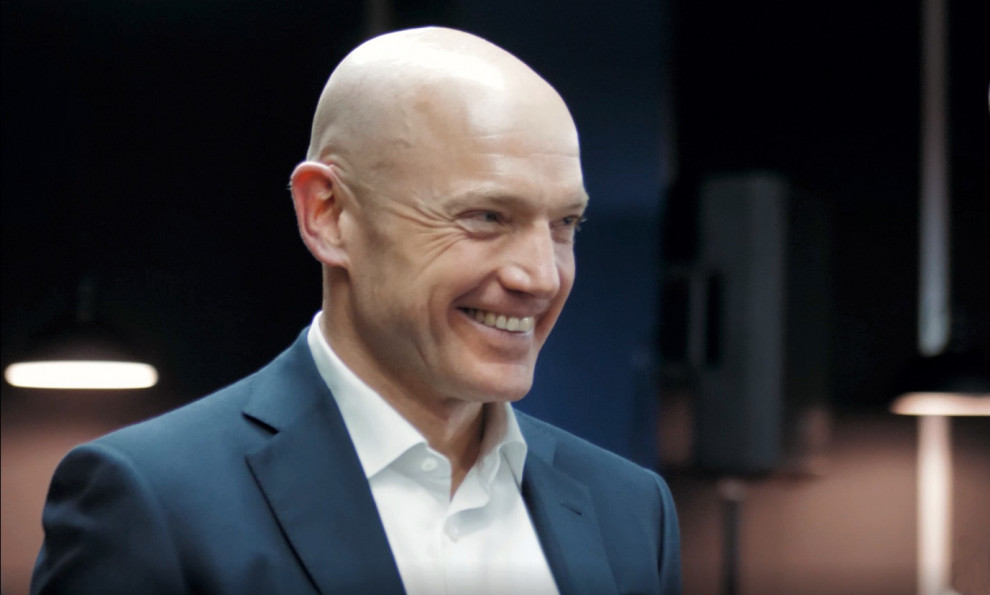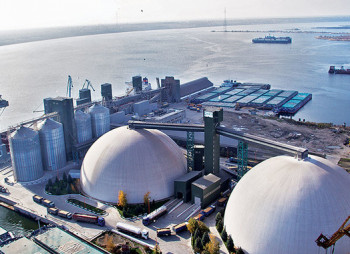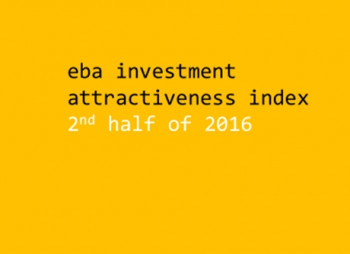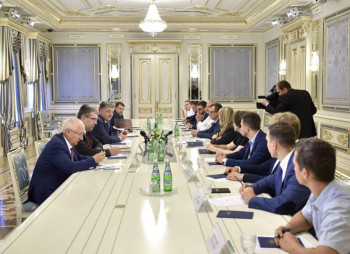In an interview with LIGA.net, Tomas Fiala told about the results of 2020 for the Ukrainian economy, how large investors look at Ukraine during the times of Volodymyr Zelensky presidentship, what happened to the economy and business, what is the result of Dragon Capital and what to expect in 2021.
- How would you describe 2020 for the Ukrainian economy?
- It depends on what to compare it with. Of course, everything is much worse than we predicted in January-February, but significantly better than we expected in March-April. I'm talking not just about a pandemic. At the beginning of the year, we expected much more work by the authorities towards the investment attractiveness of the country. Volodymyr Zelensky pleasantly surprised us immediately after the election. But somewhere in March the situation worsened – both in terms of appointments, since many reformers have left, and in terms of the growing influence of the oligarchs. But the appointments of Mylovanov and Markarova inspire the hope (ex-Minister of Economy Tymofiy Mylovanov became an adviser to the head of the President's Office, Markarova's candidacy was discussed as a possible ambassador of Ukraine in the United States). I would like to believe that this is the beginning of a positive trend.
- And if it is about the economy?
- In general, the situation is very good for Ukraine: thanks to the unprecedented fiscal and monetary response to COVID of the largest countries, the world economy is recovering in a V-shape form. Worldwide rates have declined, with expectations that the Federal Reserve and the European Central Bank will keep them near zero or even lower for the next four years. For Ukraine, this is positive, because, firstly, the dollar is weakening in international markets, and secondly, investors will look for positive returns. The external environment for Ukrainian exports has also improved, prices are at high levels. Metinvest (Rinat Akhmetov's metallurgical holding – ed.) in September 2020 showed the highest EBITDA (pre-tax profit) since debt restructuring in 2015. Kernel's EBITDA in the third quarter of 2020 was the highest in the company's history.
Another positive thing for Ukraine is the results of the US elections. Before that, many investors sat in the cash, but now the situation has become clear, besides, we will probably see a split congress in January, when the Republicans will dominate the US Senate under the presidency of Democrat Joe Biden. This means that the United States is unlikely to go to a large new package of fiscal stimulus and tax hikes. The rates will stay low for longer.
- As an investor, would you invest a lot of money in Ukrainian assets now, be it domestic government bonds or Eurobonds?
- Eurobonds of Ukraine are in demand. We also took part in the additional placement of Eurobonds last Friday, which, by the way, was very successful for the Ministry of Finance. After a long hiatus since February, foreigners started buying government bonds again in December.
- In September, you said that you see a certain loyalty to the devaluation of hryvnia on the part of the updated management of the National Bank. Do you still think so?
- At that time there really was information from some bank treasurers that the NBU did not object to the weakening of hryvnia. Later, in the National Bank itself, this was explained by technical reasons – due to the change of leaders, the reaction of the currency block for some time became not as flexible as before. Now we cannot say so, there are no complaints about the currency policy. As far as I have heard, the IMF and banks do not have any complaints too.
- Do you agree with the criticism of the former curator of the currency block at the NBU Oleg Churiy for the sharp strengthening of hryvnia in 2019?
- In my opinion, the rise in the rate was too sharp. The trend for the strengthening of national currencies was in other countries of the world, but the central banks, as a rule, limited it in single-digit percentages (in 2019, hryvnia at its peak showed almost 20% annual revaluation). The NBU could also make the revaluation less drastic, especially in the fourth quarter of 2019.
- What is the general situation with the rate? Does the devaluation that we saw in the second half of the year correspond to the processes in the economy?
- We now have a surplus of the current account of the balance of payments, therefore, theoretically, hryvnia should strengthen. On the other hand, there were negative market expectations. They were mainly caused by expectations from cooperation with the IMF.
- You also took part in creating negative expectations, when on one of the TV broadcasts at the end of March you announced a forecast for the rate of UAH 30 / $ at the end of the year. Now we see that the situation is somewhat better – the rate is closer to UAH 28 / $. Why did you decide then to come up publicly with such a forecast, if you understood that it might not come true?
- We regularly publish our forecasts, at that moment we decided not to abandon this practice, even despite the crisis. In March, we saw a serious devaluation due to capital outflow from the country. In order to repay it, the NBU had to spend $ 2 billion. Therefore, the main drop of hryvnia, which we predicted, still happened. Although our expectations have improved since then.
- Why didn't the forecast come true?
- In March, no one knew that, for example, the Federal Reserve would print more money in two months than in a year during the 2008-2009 crisis, and lockdowns will start to be over in 6 weeks, and in the third quarter we will see such a growth in world GDP.
- Why is the whole world, including emerging markets, flooded with money, but inflation is not growing?
- Low demand and high supply. Weak consumption. People are worried about whether they will have a job and income, so they increase their savings, buy less and use less credit. On the other hand, the economy has fallen sharply, which means that producers do not use all their capacities, that is, they cannot afford to raise prices.
- Why can't Ukraine print money in response to the crisis, as developed countries do? Or can it still do so?
- It should be remembered that Ukraine's credit rating is still five to six levels below the investment grade. This means that if we print money, we will immediately get devaluation: since there is no trust in hryvnia assets, the additional resource will go into dollars.
- How did Ukrainian business survive this year? There were forecasts of bankruptcy of entire sectors – were they justified? And are there those who have benefited from the crisis?
- The situation is really deplorable in the field of tourism: hotels, restaurants, aviation. The bad thing is with the retailers who are engaged in clothing. Relatively good with electronics and furniture sales. Naturally, everything connected with online benefits. In addition, exports: agricultural companies that had no problems with the harvest, ore, metals.
- Has the state helped Ukrainian business enough?
- Not enough. I am not a supporter of any special programs, since they are difficult to design in a high-quality manner in such a short period of time and they are influenced by vested interests ("personal interests" is a term describing the influence of oligarchs, corrupt officials and other interested parties on state policy). In addition, the state is very ineffective in managing money. Even in the US and Europe, there have been huge abuses. In Ukraine, such stories end with the loss of half of the funds. But even if you look at the 5-7-9 program, only UAH 15 billion of loans were issued there, with about 70% being refinancing of old debts. That is, the expected impetus for the development of the economy did not work.
- How could the state help then?
- Do not slow down with the IMF all summer. Then we would have lower interest rates, banks would be ready to lend more. In general, it is necessary to create conditions for business – unlike these penny programs, this will have an effect on hundreds of billions.
- What are the financial results of Dragon Capital this year, if you look at the directions of business?
- Worse than in 2019, but we will have a positive result for the year, which is already good. For example, in securities trading, we realized back in February that the situation would be bad, we sold everything and went into the cash, so we didn't lose anything in March.
- What was in your portfolio: Ukrainian securities or is it a wider range of investments?
- This is a wide range of investments, but the focus is on Ukraine.
- Are there profitable companies in the direct investment segment?
- Yes, some will end the year even better than 2019. Good results in IT, e-commerce, commercial and residential real estate, record sales of suburban real estate, Novoe vremia.
- Novoe vremia – will the whole company turn a profit?
- The whole company – no. But the part of the business that operates online – yes.
- You buy financial media from Treeum holding. What for?
- We are not yet commenting on this topic, since we have just received permission from the AMCU, but the deal has not been completed yet.
- Has real estate lost its value as an asset during this time?
- It depends on what kind. Warehouses are good, our occupancy rate is close to 100%, rental rates have not dropped. Shopping centers exceeded expectations. Initially, we thought that the shopping centers would open sometime in July with an attendance of about 30% of the pre-crisis level, at the end of the year we expected 60%. But we opened earlier with an attendance of 50-60% and rose to 70-90%. Conversion and average receipt have grown: if people come to the mall, they will definitely buy something. Offices – this year the numbers are still quite good, as there are usually long contracts, but further on this segment will be the weakest. Many companies have switched to distance work, and many have suspended expansion plans.
- How many square meters of real estate do you manage?
- About 700,000 square meters. 330,000 of them are warehouses. The rest is more or less equal for shopping centers and offices.
- Are you the largest rentier in Ukraine?
- No, at least Epicenter is larger – they have over a million square meters.
- This year you bought two industrial parks, which causes some dissonance: Dragon has always been emphatically aloof from areas in which much depends on the state, while industrial parks are a story about benefits and preferences. What's the logic?
- These objects are simply called industrial parks, but they have nothing to do with benefits – we do not apply for this. The business here is that these are mainly warehouses, but we do not mind that part of the area is used for production. We are already negotiating with manufacturers, they can rent these areas from us. For example, some are interested in taking production outside the city. But you don't want to get involved with the state – It is always bureaucracy and there is a risk that if you take something from the state, then the SBU and the prosecutor's office will follow you for ten years.
- How much direct investment is in Dragon Capital's portfolio?
- We have announced the amount of direct investments over the past five years – this is about $ 500 million.
- You said that you invest only in a business that gives 30% profitability. Is it possible to reach this figure this year?
- Yes, over the past 20 years we have had an average profitability of over 30% per annum and, as a rule, we target this level. It is too early to say what will happen in 2020, we will sum up the results in January-February. But I think it will be less than 30%. Rather, even less than 20%.
- Are you interested in startups?
- Honestly, no. This is a very painstaking job where you need to make many small investments in the hope that one or two of them will take off. I probably don't like to take risks so much – I prefer larger, but reliable investments, with a certain track record.
- Did you leave agricultural industry completely after the sale of Chumak company?
- We have the Karlovsk Machine-Building Plant in Poltava region, a manufacturer of elevator equipment.
- But in general, do you consider agricultural business?
- In a way to invest my money – no. But we have serious expertise in this segment – our investment banking department serves M&A transactions and works with the attraction of financing in the agricultural sector.
- Why don't you consider your investments?
- On one hand, this sector in Ukraine is on the rise, but on the other hand, this business is very difficult to influence. Much depends on the harvest and weather conditions, on product prices. Therefore, the companies are trading at a low multiple – 4-5 EBITDA maximum. This is much less than in sectors with a higher share of added value.
- Why did it not work out with the purchase of Idea Bank?
- Mainly due to the onset of the COVID crisis. We signed the sale and purchase agreement in December 2019, but the final cost of the shares had to be agreed upon after additional pre-closing due diligence. Unfortunately, we did not agree with the seller on the final figures.
- Are you looking at other banks now? Have you considered, for example, the Credit Dnepr bank recently bought by Alexander Yaroslavsky from Viktor Pinchuk?
- We looked more at retail banks. A large corporate portfolio in Ukraine is a risky business. There is a lot of competition for good customers, the business margin is low. For the rest, issuing corporate loans is risky, since there is no rule of law in the country. Borrowers can "bring" up to 10% of the loan amount to the courts and law enforcement agencies and, due to this, simply say "goodbye" to the bank.
- How much, in your opinion, does it need to be invested to create a competitor to Privat and Monobank?
- Monobank has three million clients, the cost of such a bank is hundreds of millions of dollars. I think that investments are needed at least several tens of millions of dollars.
- Dragon Capital donated a building in Kyiv to Kyiv School of Economics. What were the terms?
- We bought this building ourselves, now we are doing repairs there. All together it will cost about $ 5 million. The building is more than 4 thousand square meters. We do all this specifically for Kyiv School of Economics. Terms and conditions: they rent it from us at a rate several times lower than the market rate, and have the right to buy the building at cost price at any time, paying the entire amount at once or in parts.
- What is this for you – charity or a special investment in education?
- Ukraine lacks people with good economic education. Thanks to such a base, the School will be able, firstly, not to worry about the rental rate and the fact that after some time they will have to look for a new place, and secondly, they will be able to train about 500 people a year on long-term programs and several thousand – on short-term.
- Who else do you support on a charitable basis?
- There is a program for Ukrainians studying at Stanford: every year three people go there to study. Then we support the Center for Economic Strategy, the Anti-Corruption Center, Transparency International, Okhmatdet in the field of digitalization of processes. Also – the Ukrainian Academy of Leadership, helped the Ukrainian Catholic University to build the Collegium (a place of common residence and communication of students, teachers and university employees).
- How much do you spend on these programs?
- This year it turns out about $ 6 million.
- Such charitable activity does not interfere with your business, given that recently many politicians in Ukraine focus their rhetoric on "anti-Soros sentiments" and your surname in such cases usually goes after George Soros, separated by comma?
“I don’t think it hinders business. Of course, there is black PR, but it only brings a smile. Smart people understand everything, but the opinion of the stupid is not so important. On the other hand, the growing influence of pro-Russian and oligarchic forces motivates us to help the right undertakings even more so that these forces do not win in Ukraine.
- How can the story with PrivatBank end, in your opinion?
- It is difficult to tell. We see that on the part of the authorities and law enforcement agencies – not only under President Zelenskiy, but also under Poroshenko – there is no desire to compensate somehow the state's costs to save the bank. The government is too weak to try to return this $ 5.5 billion. There are hopes only for the courts in the UK, USA, Cyprus and Israel.
- Do your forecasts include a scenario in which PrivatBank will be returned to its former owners?
- Return to Kolomoisky and Bogolyubov – no. But it is possible that they will achieve some kind of compromise and offset with the state.
- What is the margin of safety for Kolomoisky? Will we wait until he runs out of money, given the worldwide arrest of their assets with Bogolyubov?
“They have enough assets here. They parasitize state-owned enterprises, for example.
- At his big press conference last year, Volodymyr Zelenskyy directly called your company something like a "foreign agent" – in the negative sense of the word. How do you work under this government?
- I was surprised by such attention to me as the owner of Novoe Vremia, especially since in one of the interviews before the elections Zelensky said that on the contrary he would like to attract foreign investors to the media sector in order to reduce the role of oligarchic media. Since then, I have not heard anything about this issue. In general, there was one general meeting of business associations with Zelensky. This was in February. Then we told the president that we are satisfied with what is happening in the country, and he gave the impression of a person who could listen to business. After that, there were no more contacts. And the president’s actions in terms of appointments went against his campaign promises and business vision.
Nevertheless, business is grateful to the president and the government for the decision not to announce a lockdown in December, since this is the most active month in retail sales, and the damage to small and medium-sized businesses would be maximum. We have recommended this scenario and are glad that the President listened to the opinion of the business.
- After the resignation of the head of the NBU, Yakiv Smoliy, you announced that you were suspending investments in Ukraine, but in fact resumed them after a short period of time. Have you seen anything good in the actions of the government?
- We have suspended investments until we understand what will happen to the NBU's monetary policy after the change of management. There was a risk that it would change towards financing the budget and devaluation of hryvnia. That did not happen.
- Is this the merit of the new management, which remains independent or the situation is holding because of the threat to lose the support of the IMF completely?
- The new head of the NBU, Kyrylo Shevchenko, has a good reputation, business and banks are satisfied with the policy and communication of the National Bank.
- Why is the independence of the National Bank important even in times of crisis?
- If the NBU does not print money, it motivates the government to behave in a disciplined manner and not to inflate costs. And the main thing is to carry out reforms.
- What are your expectations for the hryvnia exchange rate in 2021?
- Due to high prices for our exports, current account surplus and renewed interest of foreign investors in our government bonds, we expect an average rate in 2021 at UAH 27.2 / $, and at the end of the year - UAH 28 / $. In the first half of the year, the exchange rate may strengthen more – up to UAH 26 / $. We do not expect the NBU to allow the rate to strengthen by more than 10%. This would hurt economic growth.
- What risks for the economy do you see next year?
- Fiscal risk. The budget deficit must be reduced. This year, the 7.5% deficit will not be achieved in any way, we expect that it will not exceed 5-5.5% of GDP. More funding will not work, so costs will have to be cut by at least UAH 60 billion. In 2021, the government needs to attract about $ 20 billion in financing: to refinance old debts and cover the still huge budget deficit of UAH 230-240 billion. This is a lot of money. They cannot be found without the IMF and other external creditors. This means that you will have to be disciplined, reduce costs and deficits, and make reforms.
- What is the safety margin of this structure? How much time is there for negotiations with the same IMF?
- Next year the period from September to December will be quite difficult, so by that time it will be necessary to agree with the IMF. If we can still "loop through" the first half of the year, then in the second without the IMF we will either have to make a substantial sequestration of the budget or print money. But then we will immediately face a sharp devaluation and inflation.
- Are there risks outside the economy?
- Oligarchs. Kolomoisky, Medvedchuk. The first is interested in chaos, since he is actually not allowed to leave the country due to an investigation in the United States. The second is funded from Russia. Both can add big problems.






